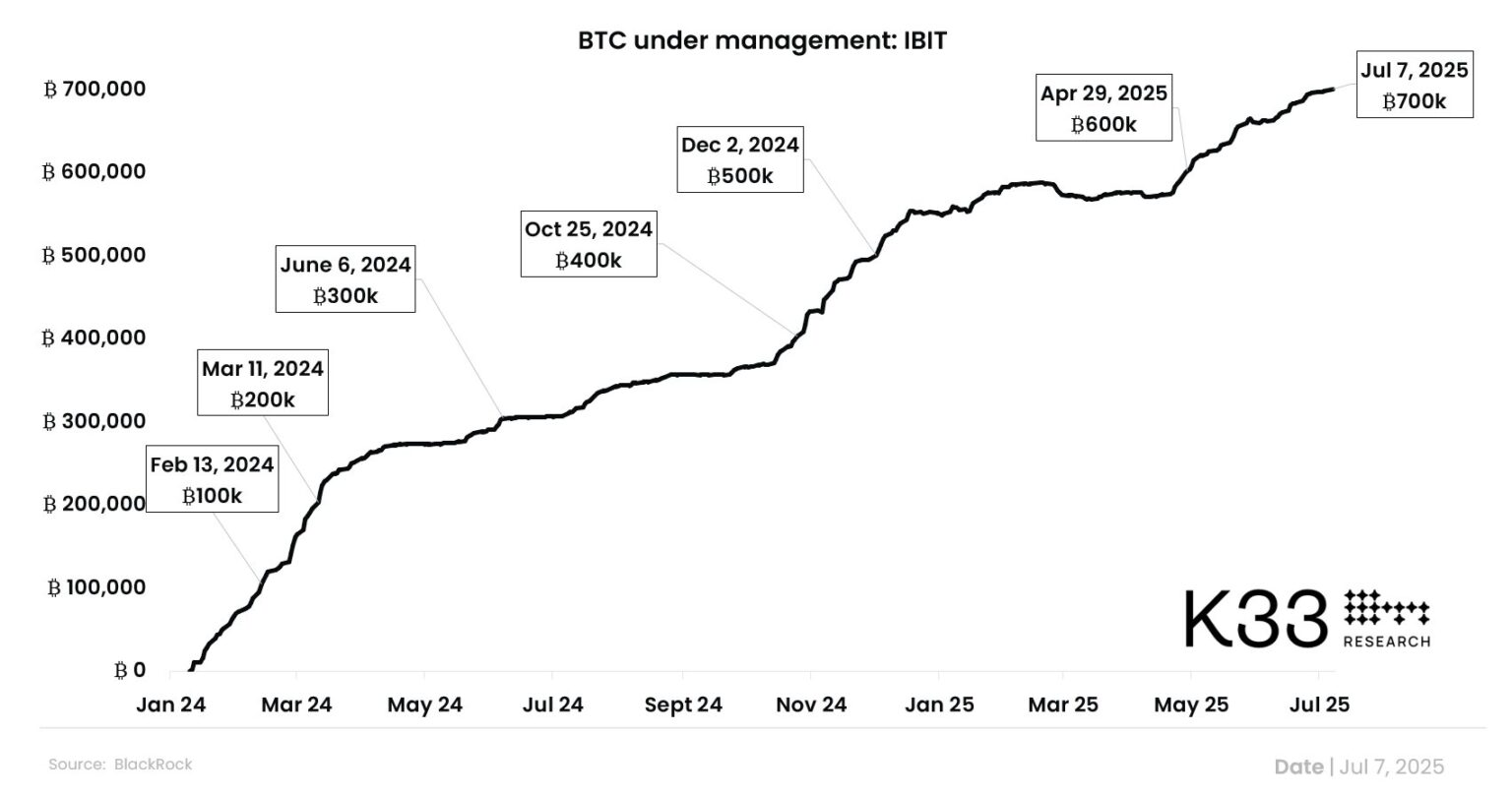BlackRock’s IBIT ETF Surpasses Major Milestones: A Deep Dive into Bitcoin ETFs
In an impressive feat for the cryptocurrency industry, BlackRock’s iShares Bitcoin Spot ETF (IBIT) has surpassed a significant milestone, boasting over 700,000 BTC (approximately $76 billion) in assets under management (AUM) just 18 months post-launch in January 2024. This surge in popularity marks a transformative moment for the fund, which has rapidly climbed the ranks to become one of BlackRock’s highest revenue-generating ETFs. As new investors flock to this product, it raises the enduring question of whether Bitcoin ETFs will play a pivotal role in the broader adoption of digital assets.
IBIT’s Ascension in the ETF Landscape
The rapid growth of BlackRock’s IBIT ETF is particularly striking, considering it accumulated a staggering 698,919 BTC by July 3, 2024. Following the Independence Day holiday, the fund received an additional 1,510 BTC in net inflows, helping it surpass the 700,000 BTC threshold. Veteran analysts, including K33’s Head of Research Vetle Lunde, have discussed this significant milestone on social platforms, highlighting the ETF’s rapid ascent and immense appeal. Nate Geraci, president of NovaDius Wealth Management, remarked, “700,000 in 18 months. Ridiculous,” emphasizing the unprecedented pace at which IBIT has gained traction.
Competition Among Bitcoin ETFs
The growth of IBIT is reflected within a competitive market landscape. Just over a year ago, IBIT overtook Grayscale’s Bitcoin Trust (GBTC), a product that initially held a commanding lead. GBTC’s assets have since diminished by about 70%, falling from approximately 619,220 BTC to 184,226 BTC. Meanwhile, other products like Fidelity’s FBTC have also shown significant growth, surpassing GBTC with over 200,000 BTC in AUM. This competitive dynamic illustrates the evolving interest in Bitcoin ETFs as they provide a more efficient and user-friendly way to invest in cryptocurrencies.
The Rise of U.S. Spot Bitcoin ETFs
The overall landscape for U.S. spot Bitcoin ETFs has dramatically evolved, with total combined assets now reaching approximately 1.25 million BTC, or $135 billion, according to CoinGlass data. IBIT alone accounts for roughly 56% of this combined AUM, establishing itself as a dominant player in the market. This substantial accumulation further underscores the ETF’s effectiveness in attracting investments within the burgeoning cryptocurrency sector.
Inflows and Market Share
Moreover, the U.S. spot Bitcoin ETFs recently achieved a cumulative inflow milestone of $50 billion, a feat celebrated within the financial community. BlackRock’s IBIT contributes significantly to this total, leading the charge with $52.9 billion in inflows since its inception. While there has been a substantial presence of outflows from Grayscale’s GBTC, IBIT’s growth has been remarkably steady, indicating its appealing investment proposition. Just recently, IBIT accounted for around 80% of the trading volume, capturing a hefty share of the $2.9 billion in trading that took place on a particularly busy Monday.
What This Means for the Future of Bitcoin Investing
The impressive performance of IBIT raises critical questions about the future landscape of Bitcoin investing and ETFs. As institutional and retail investors recognize the potential of Bitcoin ETF offerings, we are likely to see increased competition and innovation in this space. The rapid growth of IBIT and its accompanying products signifies a broader acceptance of cryptocurrency as a legitimate investment vehicle, likely paving the way for more entrants and diversified products in the future.
Conclusion: A Bright Future for Bitcoin ETFs
In conclusion, BlackRock’s IBIT represents a substantial advancement in the world of Bitcoin ETFs, reaching over 700,000 BTC in AUM within a relatively short span. Its swift rise to prominence showcases the growing interest and acceptance of cryptocurrencies among both institutional and retail investors. As major players continue to innovate and create new products, the future of Bitcoin ETFs looks promising, potentially attracting a larger base of investors and further legitimizing the cryptocurrency market as a whole. The success of IBIT indicates that Bitcoin, once viewed as a niche asset, is evolving into a mainstream financial instrument, heralding new opportunities in the digital finance era.


